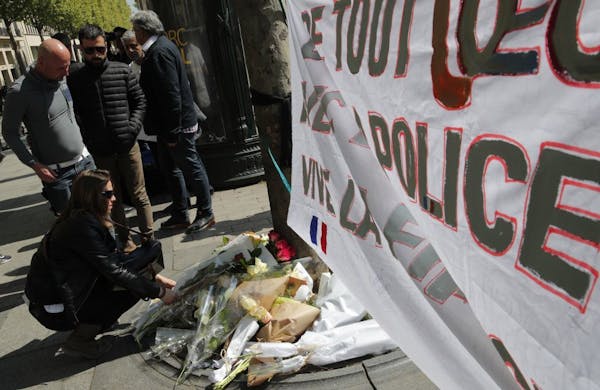PARIS – Of the four candidates with a realistic chance to become France's next president, three oppose Western sanctions against Russia.
Two would take France out of NATO's military command, or perhaps remove it from the alliance altogether.
And the one candidate who fits neither category would dramatically increase European defense cooperation to lessen dependence on what he regards as an unreliable United States.
When French voters make their choices Sunday in the first round of the country's unpredictable presidential race, the status quo for Western security won't be on the ballot. Instead, the election could become another convulsive moment for a decades-old international security order that is wobbling from the turbulence of President Donald Trump.
In the run-up to the vote, attention both inside and outside France has focused on the political and economic consequences of a potential French exit from the European Union or the euro currency. With the killing of a Paris police officer Thursday night in an attack claimed by the Islamic State of Iraq and Syria, proposals to close borders and aggressively crack down on domestic security threats are also at the center of debate. But the election's impact on NATO and other elements of defense could be equally profound.
Victory for either the far-right or the far-left — candidates representing either extreme are among those locked in the four-way contest for a ticket to the second round — would mark a pronounced break for a country that is one of two nuclear-armed powers in Europe, with the world's sixth most powerful military and a seat on the United Nations Security Council.
"It would be catastrophic — the undoing of 65 years of foreign and security policy," said François Heisbourg, an analyst with the Foundation for Strategic Research and a former defense ministry official. "This is big."
If there's peril for the West, there's opportunity for Russian President Vladimir Putin. Russia meddled in the U.S. election to help Trump, according to U.S. intelligence agencies. Whether it's interfering in France is less clear. But analysts say the election offers another potentially disruptive moment for the West that Russia would relish — and likely seek to exploit.
"Putin would take advantage," Heisbourg said. "The risk of war in and out of Europe would be quite high."
Not that anyone in France has been talking about it much.
With immigration, the economy and France's E.U. membership topping the campaign agenda, international security and defense are hardly mentioned in speeches.
To the extent that the issues are raised at all, it's to promise a boost in spending for the country's battle-weary armed forces. That, at least, is one area where there's consensus among the main candidates.
Yet on more fundamental questions that have been overshadowed, there are sharp disagreements — as well as promises of a radical departure.
"No matter who wins," a recent analysis by the London-based European Leadership Network concluded, "France's security and defense policy will not be the same, and some candidates would bring revolutionary changes."
The most dramatic shift would come if the far-right's Marine Le Pen or the far-left's Jean-Luc Mélenchon manages to pull off a win — a prospect once dismissed as anything from unlikely to impossible, but now being seriously contemplated across Europe.
Despite coming from opposite ends of the political spectrum, both candidates are hostile toward NATO. Mélenchon has dismissed the alliance as a Cold War "anachronism" and an emblem of U.S. imperialism that he wants France to exit.
Le Pen also argues that NATO's time has passed, and that France should at least abandon the alliance's integrated command structure.
An admirer of Trump's, she recently took rare issue with him when he reversed his earlier criticism of NATO and described it as "not obsolete."
"I am coherent," Le Pen told France Info radio in a dig at Trump and a confirmation of her own continuing anti-NATO views. "I don't change my mind in a few days."
Le Pen's antipathy for the alliance at the heart of Western security since the aftermath of World War II appears to be rooted in her fondness for Putin. She even visited Moscow for an audience with the Russian president last month.
Le Pen, whose party received a 9-million-euro loan from a Moscow-based bank in 2014, has endorsed the Russian annexation of Crimea, called for a lifting of Western sanctions and proposed a new global power axis among Putin, Trump and herself.
If anyone other than independent candidate Emmanuel Macron wins the vote, Putin would, at the very least, have a more sympathetic counterpart in the Élysée Palace.
Mélenchon, for instance, has accused the West of provoking Russia with its missile-defense systems and NATO expansion into Eastern Europe. He wants to lift sanctions, and revive historically close Russian-French ties.
Center-right candidate François Fillon, meanwhile, has also emerged as a sharp sanctions critic, arguing the measures intended to punish Russia for its military intervention in Ukraine end up hurting the French economy.
Fillon has ties to Moscow, but he believes in the necessity of NATO — though he's often skeptical of it.
The only major candidate who does not favor a softer line on Russia is Macron. He goes out of his way to criticize Putin and argued that France has a responsibility to speak out.
Instead Macron has pushed for Europe to develop its own integrated defense networks outside the structures of NATO. It's an idea — shared by Fillon — that has gained currency amid fears that Trump will withdraw or weaken the U.S. protective umbrella.
